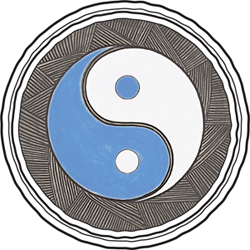Taoism
FOUNDED: Taoism began about 2,500 years ago in China.§
FOUNDER: Lao-tzu, whom Confucius described as a dragon riding the wind and clouds.§
MAJOR SCRIPTURE: The Tao te Ching, or “Book of Reason and Virtue,” is among the shortest of all scriptures, containing only 5,000 words. Also central are the sacred writings of Chuang-tsu.§
ADHERENTS: Estimated at 50 million, mostly in China and and other parts of Asia.§
SECTS: Taoism is a potently mystical tradition, so interpretations have been diverse and its sects are many.§
The Tao, or Way, has never been put down in words; rather it is left for the seeker to discover within. Lao-tzu himself wrote, “The Tao that can be named is not the eternal Tao.” Taoism is concerned with man’s spiritual level of being, and in the Tao te Ching the awakened man is compared to bamboo: upright, simple and useful outside—and hollow inside. Effulgent emptiness is the spirit of Tao, but no words will capture its spontaneity, its eternal newness. Adherents of the faith are taught to see the Tao everywhere, in all beings and in all things. Taoist shrines are the homes of divine beings who guide the religion, bless and protect worshipers. A uniquely Taoist concept is wu-wei, nonaction. This does not mean no action, but rather not exceeding spontaneous action that accords with needs as they naturally arise; not indulging in calculated action and not acting so as to exceed the very minimum required for effective results. If we keep still and listen to the inner promptings of the Tao, we shall act effortlessly, efficiently, hardly giving the matter a thought. We will be ourselves, as we are.§
The primary goal of Taoism may be described as the mystical intuition of the Tao, which is the Way, the Primal Meaning, the Undivided Unity, the Ultimate Reality. Both immanent and transcendent, the Tao is the natural way of all beings, it is the nameless beginning of Heaven and Earth, and it is the mother of all things. All things depend upon the Tao, all things return to it. Yet it lies hidden, transmitting its power and perfection to all things. He who has realized the Tao has uncovered the layers of consciousness so that he arrives at pure consciousness and sees the inner truth of everything. Only one who is free of desire can apprehend the Tao, thereafter leading a life of “actionless activity.” There is no Personal God in Taoism, and thus no union with Him. There are three worlds and beings within them, and worship is part of the path.§
One who follows the Tao follows the natural order of things, not seeking to improve upon nature or to legislate virtue to others. The Taoist observes wu-wei, or nondoing, like water which without effort seeks and finds its proper level. This path includes purifying oneself through stilling the appetites and the emotions, accomplished in part through meditation, breath and other forms of inner discipline, generally under a master. The foremost practice is goodness or naturalness, and detachment from the Ten Thousand Things of the world. §
- I believe that the Eternal may be understood as the Tao, or “Way,” which embraces the moral and physical order of the universe, the path of virtue which Heaven itself follows, and the Absolute—yet so great is it that “the Tao that can be described is not the Eternal Tao.”
- I believe in the unique greatness of the sage Lao-tsu and in his disciple Chuang-tsu.
- I believe in the scriptural insights and final authority of the Tao te Ching and in the sacredness of Chuang-tsu’s writings.
- I believe that man aligns himself with the Eternal when he observes humility, simplicity, gentle yielding, serenity and effortless action.
- I believe that the goal and the path of life are essentially the same, and that the Tao can be known only to exalted beings who realize it themselves—reflections of the Beyond are of no avail.
- I believe the omniscient and impersonal Supreme is implacable, beyond concern for human woe, but that there exist lesser Divinities—from the high Gods who endure for eons, to the nature spirits and demons.
- I believe that all actions create their opposing forces, and the wise will seek inaction in action.
- I believe that man is one of the Ten Thousand Things of manifestation, is finite and will pass; only the Tao endures forever.
- I believe in the oneness of all creation, in the spirituality of the material realms and in the brotherhood of all men.
